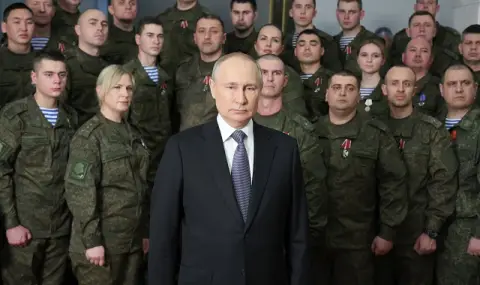For months, the Russian military has made only limited gains on the battlefield against Ukrainian troops experiencing a shortage of weapons and ammunition. That presents a growing challenge for Russian President Vladimir Putin as his military's edge begins to wane, Bloomberg reports.
Russia's attempt to open a new front in Ukraine's northeastern Kharkiv region already appears stalled, falling short of Putin's goal of creating a buffer zone along the border. Ukraine claims it is inflicting "very heavy losses" of the Russian troops in the battles around the city of Volchansk.
Russian forces have made little progress since capturing the strategic eastern Ukrainian town of Avdiivka in February at the cost of huge casualties after months of fighting. For weeks, they have been trying to capture the key settlement of Chasov Yar in the eastern Donetsk region.
Russia's strategy to wear down Ukrainian forces is "very expensive and bloody for the Russian military itself," said Ruslan Pukhov, head of the Moscow-based Center for Strategic and Technological Analysis. "This could lead to an excessive depletion of forces on the Russian side, which in turn gives the Ukrainians a chance to counterattack.
As Russia steps up attacks at several points along the front line, "we have chances to change the situation in our favor," Ukrainian Armed Forces Commander-in-Chief Oleksandr Syrsky said on Telegram on Wednesday.
Putin insists his military goals are unchanged and that Russia will fight as long as it takes to win in Ukraine, regardless of mounting casualties in a war that is in its third year with no end in sight. Ukraine and its allies face the challenge of maintaining resistance in a war that has largely stalled.
While Ukrainian officials have raised the alarm about the threat of a Russian breakthrough during months of delays in US arms shipments, Kiev's troops have mostly held the line despite being outnumbered 10-1 by Moscow's invading army. After the US Congress finally approved $61 billion in funding in April, the balance of firepower began to shift.
"Ukraine was in a deep hole because of the delay" in sending American weapons "and they were crawling out of that hole,", US national security adviser Jake Sullivan told reporters on Tuesday aboard Air Force One. "We saw them withstand the Russian onslaught" and in a rapidly evolving situation, "weapons arriving on the battlefield in scale and quantity over the last few days and weeks have made a difference," he said.
European Union countries are also increasing aid and arms supplies to help Kiev, although Hungary's Russia-friendly government continues to block billions of euros for wider military support.
Putin must now also contend with a shift in the attitude of Ukraine's allies, with the US and Germany joining nations including the UK in allowing Kiev to use their weapons to strike targets in border areas in Russia. French President Emmanuel Macron on Thursday said he was working to send a coalition of instructors to train thousands of troops in Ukraine, despite threats of retaliation from Moscow.
Group of Seven leaders will meet next week in Italy to weigh plans to extend loans to Ukraine using a windfall of some $280 billion in frozen Russian central bank assets.
Putin's decision to appoint economist Andrey Belousov as defense minister last month in place of his longtime ally Sergei Shoigu underscored Russia's need to squeeze more from the stretched resources of an overheated economy, even if unprecedented international sanctions failed to cause a collapse.
Defense spending as a percentage of gross domestic product is approaching levels last reached at the height of the Cold War in the 1980s under the Soviet Union, limiting Russia's ability to continue increasing military production.< /p>
While Russia has significantly increased production of missiles, artillery, tanks and ammunition since the February 2022 invasion, "building an effective economy for the armed forces is essential today," Putin said at a May 25 meeting with representatives of the defense industry. It must "generate a return on every ruble we invest in it".
Certainly, both countries face enormous challenges, especially in recruiting replacements for killed or wounded soldiers.
